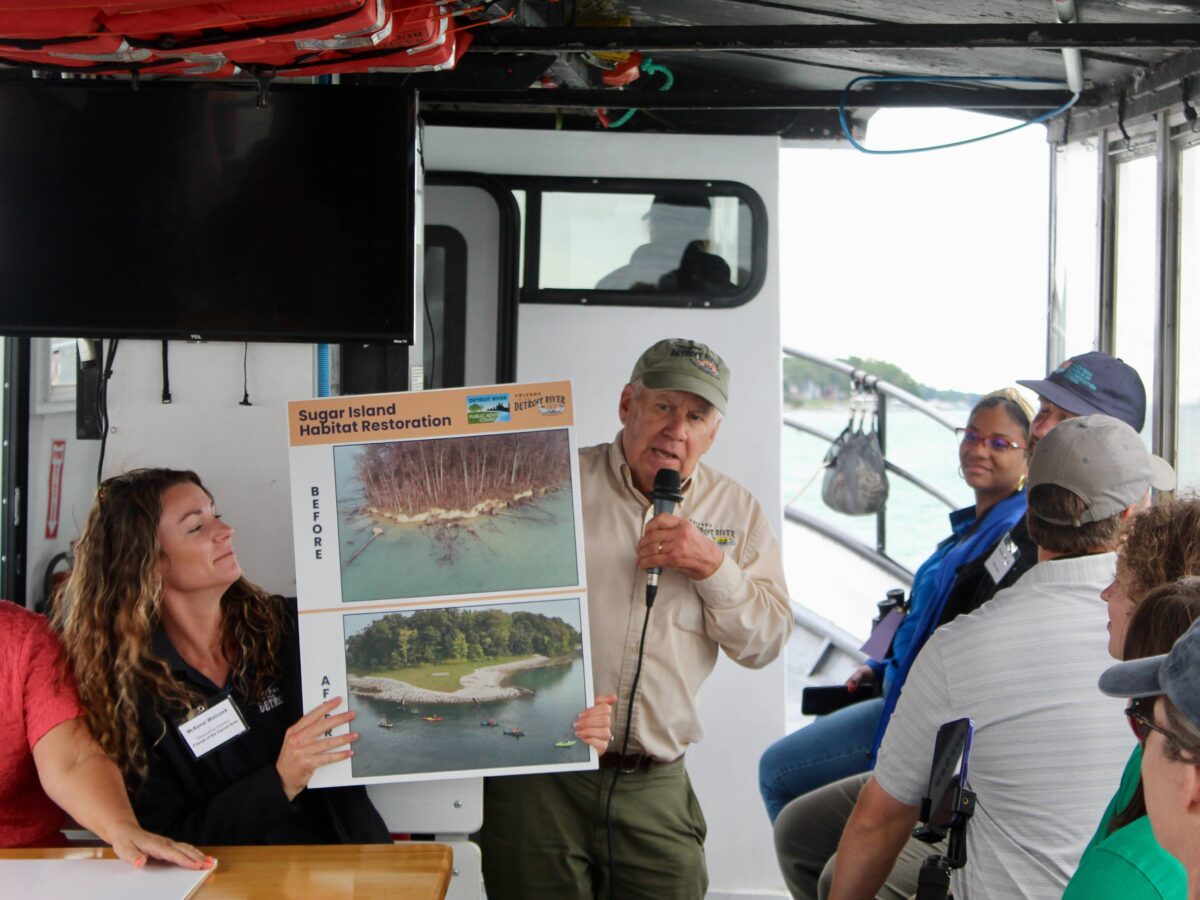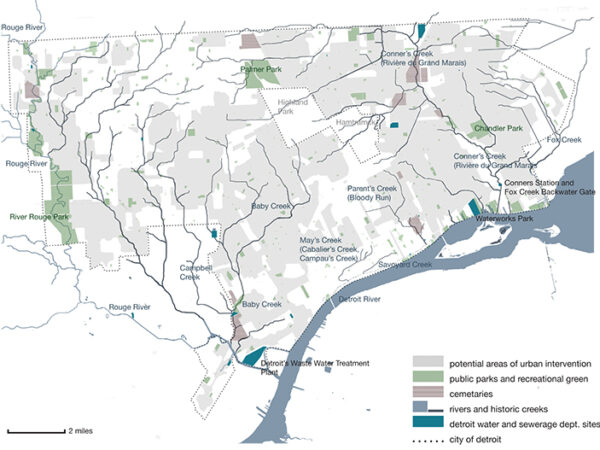Overview:
- A port authority plan aims to bring 23 private terminals along the Detroit River and Rouge River to net zero emissions by 2040.
- “I’m trying to be the voice of sustainability in a space that may not be ready to transition,” says sustainability manager Taylor Mitchell.
- The Grosse Pointe North High School graduate attended North Carolina Agricultural and Technical State University, a historically Black college.
This story was produced in collaboration with the Detroit River Story Lab, a University of Michigan initiative that supports local efforts to center the river as a site of connection and belonging. The Lab’s local journalism portfolio includes the Detroit River Stories podcast series, the 100 Years Ago Today blog, and the Detroit River Beat, a collection of student-authored stories about the river’s role in sustaining human and more-than-human communities throughout the region.
Taylor Mitchell grew up asking whether the fish and birds in the Detroit River were safe. As a child, she spent time on Belle Isle with her family and wondered what pollution meant for the wildlife she saw around her.
Now, as the Detroit Wayne County Port Authority’s first sustainability manager, Mitchell is leading efforts to cut diesel emissions from port operations that have long polluted neighborhoods like Delray.
Mitchell oversees the Authority’s Decarbonization and Air Quality Improvement Plan, which sets a goal of bringing 23 private terminals along the Detroit and Rouge rivers to net zero emissions by 2040. Much of that work focuses on reducing carbon emissions from diesel-powered trucks, ships, cranes, and other equipment used to move freight.
“I’m trying to be the voice of sustainability in a space that may not be ready to transition,” Mitchell said. “But I’m hoping others can see the benefit of this work, and that our government can contribute to the shift toward sustainable practices.”
From Detroit roots to career in sustainability
Mitchell’s path to this role reflects both local roots and national experience. She graduated from Grosse Pointe North High School before attending North Carolina Agricultural and Technical State University, a historically Black college, where she studied environmental science.
Mitchell later earned a master’s degree in sustainable systems at the University of Michigan’s School for Environment and Sustainability.

Leaving Detroit for college gave Mitchell perspective, but coming back gave her purpose, she said.
“I love Detroit and was able to grow a lot here and develop the foundation for who I am, but leaving the state and attending an HBCU was pivotal,” she said. “I was able to really grow and develop as a scientist and a leader.”
Mitchell returned to her home state, where she attended University of Michigan’s School for Environment and Sustainability to obtain her master’s degree with a focus on sustainable systems.
In graduate school, Mitchell said she immersed herself in big-picture ideas about climate solutions.
“As a student, you get to dream big about how you are going to fix these issues and envision the impact you’re going to have,” she said. Now, working in government, she sees the real-life obstacles — funding, politics, and limited resources.
“I am trying to be the voice of sustainability in a space that may not be ready to transition,” she said. “But I am hoping that others can see the benefit of this work and also that our government can contribute to the assistance of transitioning over to sustainable practices.”
Port Authority builds momentum with federal funds
Mitchell’s position comes at a pivotal moment for the Port Authority, which recently received $24.9 million from the EPA’s Clean Ports Program. The funding will cover the cost of electric forklifts, gantry cranes, and other low-emission equipment at private terminals. It marks the authority’s first significant push to decarbonize freight operations in the Detroit region.
The Port Authority is also studying whether hydrogen power could play a role in the transition. Officials are exploring how hydrogen could be used in a maritime setting and what role Detroit might play in a broader statewide move toward hydrogen fuel.
To keep momentum, Mitchell helped form a Low Carbon Port Committee, where terminal operators share sustainability goals and discuss ways the authority can support them. “Some of the private companies we work with have been super engaged and very excited about this work,” she said.
While collaboration with private companies is key, Mitchell said much of her role also involves making complex sustainability issues understandable to a wide range of audiences.
“I won’t assume that even the government official or private terminal owner understands all of these concepts,” she explains, “but taking the pressure away and focusing on potential impacts keeps people engaged and interested in what it means to live in a clean, green world.”
Mitchell’s personal connection to portside pollution
For Mitchell, the work is more than technical. She has family ties to Delray, one of Detroit’s most heavily polluted neighborhoods, located next to the port and I-75.
“If we aren’t thinking about the people impacted by the port’s pollution, then what are we doing this for?” she said.
Studies have shown that residents of port-adjacent communities face higher risks of asthma and other health problems due to diesel exhaust and industrial emissions. Environmental health advocates have long pressed government agencies and industry leaders to do more.
Mitchell said that perspective shapes how she approaches her work. “Community members know air quality. They’ve lived through it for a long time. They know more about the day-to-day experience than I do. My role is to come into the room as both a teacher and a student.”
MORE DETROIT RIVER COVERAGE
Detroit River nonprofit targets wetlands loss with island habitat restoration
The Detroit River lost “probably 95%” of its coastal wetlands, “particularly on the Detroit side,” says riverkeeper Bob Burns.
Detroit’s ghost streams: Maps of hidden waterways combat city’s flooding problem
This story was produced in collaboration with the Detroit River Story Lab, a University of Michigan initiative that supports local efforts to center the river as a site of connection and belonging. The Lab’s local journalism portfolio includes the Detroit River Stories podcast series, the 100 Years Ago Today blog, and the Detroit River Beat, a collection of student-authored…
VOICES: EPA endangerment finding rollback ignores climate reality
The EPA’s rollback of the endangerment finding, a key ruling acknowledging greenhouse gases as a public health threat, dismisses scientific consensus and exacerbates health challenges for communities already facing climate change impacts, write Alexander Rabin and Lisa DelBuono.
Equity, accountability on the river
Mitchell prioritizes open communication between the Port Authority and surrounding neighborhoods. She said she often slows down technical discussions to keep them accessible for residents and decision-makers alike.
“I won’t assume that even a government official or private terminal owner understands all of these concepts,” she said. “Taking the pressure away and focusing on potential impacts keeps people engaged.”
She said some of her most rewarding experiences have been meeting with residents who express cautious optimism about pollution-mitigation projects. “Knowing how this community has been historically impacted by industry and being able to engage with them is my favorite part of this job,” she said.
Port Authority engages the next generation
Mitchell also sees education as key to building a more sustainable maritime sector. Through a partnership with the Detroit River Story Lab, the Port Authority co-hosts an annual career expo that introduces students to jobs in shipping and logistics.
“People just don’t know about the maritime industry and the opportunities that exist — like working on a laker vessel and traveling the Great Lakes,” she said.
Other public events highlight the Detroit River’s role in the region’s history and economy. “Many people who live right along the river may not know the impact it has had on our state and country,” Mitchell said. “Learning that history builds pride and a stronger sense of connection.”
For her, that connection is personal. “The Detroit River has always been a place for family,” she said. “Just looking at the river and being there made us feel connected to it and to each other.”
How to get involved
The Port Authority is forming a community advisory board to guide its sustainability and decarbonization work. Members will provide feedback on projects and help ensure residents’ voices are included in decision-making. Residents interested in applying can visit www.portdetroit.com for details.





